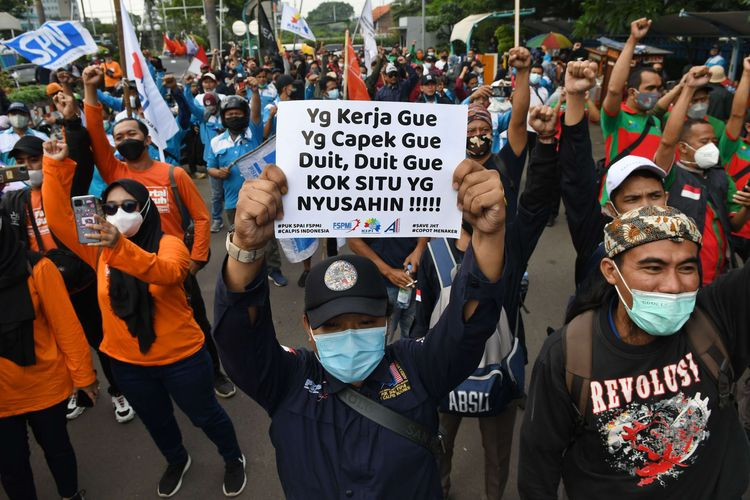Popular Reads
Top Results
Can't find what you're looking for?
View all search resultsPopular Reads
Top Results
Can't find what you're looking for?
View all search resultsSaving pension funds
The longer that the mismanagement remains, the larger the financial losses incurred by pension funds will be, because, like life insurance funds, pension funds are long-term and have long-term contingent liabilities.
Change text size
Gift Premium Articles
to Anyone
 All about money: Dozens of workers rally outside the Manpower Ministry on Feb. 16, 2022, on Jl. Gatot Subroto in South Jakarta to demand the cancellation of a ministerial regulation that requires workers to wait until they reach 56 years of age before they can withdraw from their pension funds. (Antara/Aditya Pradana Putra)
All about money: Dozens of workers rally outside the Manpower Ministry on Feb. 16, 2022, on Jl. Gatot Subroto in South Jakarta to demand the cancellation of a ministerial regulation that requires workers to wait until they reach 56 years of age before they can withdraw from their pension funds. (Antara/Aditya Pradana Putra)
T
he concerning official revelation last week that 34 out of 48, or 70 percent, of the pension funds managed by state-owned enterprises (SOEs) were mired in unhealthy financial conditions because of mismanagement should be welcomed as an early warning to prevent financial disaster.
Although many of the estimated 100 SOEs are notorious for poor governance, they still have a major role in the economy in terms of tax revenue, dividends, employment, price stabilization for several basic commodities and the delivery of public services.
SOEs Minister Erick Thohir announced that the unhealthy financial condition was discovered by a general examination by the internal control directorate of his ministry. Four pension funds, which were subjected later to investigative audits by the Financial and Development Supervisory Agency (BPKP), were implicated in the misappropriation of funds with potential state losses of Rp 300 billion (US$19.1 million) and were referred to the Attorney General’s Office for further investigation and prosecution.
Erick’s disclosure of the problems within pension funds managed by SOEs should jolt the Financial Services Authority (OJK), which is in charge of regulating and overseeing the financial services industry, including long-term funds such as pension funds and life insurance firms, to strengthen its supervisory system.
The longer that the mismanagement remains, the larger the financial losses incurred by pension funds will be. The funds in question, which include those responsible for life insurance, are all long-term funds with long-term contingent liabilities. Mismanagement at state-owned life insurance firms PT Jiwasraya and Asabri caused Rp 40 trillion ($2.6 billion) in state losses because the misconduct occurred for many years before the misappropriation of funds was uncovered in 2020.
The OJK must improve its oversight of pension fund management in the public and private sectors given the important role of pension funds as a source of funds for long-term projects. With their long-term focus and need for stable returns, pension funds can play a pivotal role in financing infrastructure projects which in turn can contribute to economic development, job creation and the improvement of essential public services. As Indonesia will continue to enjoy demographic dividends for the next 15 years before the aging-population phenomenon sets in, pension funds have big potential to expand.
The challenge, however, is that the duration of pension fund liabilities may extend over several decades. Managing these long-term obligations requires careful asset-liability matching and consideration of interest rate risks. Mismatched durations between assets and liabilities can lead to challenges in meeting pension obligations, especially during economic downturns.
Balancing current contributions with future payouts is essential to maintaining a fund's solvency. Adequate funding is crucial to meet pension obligations without compromising a fund's financial health. Developing and maintaining a sustainable long-term investment strategy is critical. Striking a balance between generating returns and preserving capital to meet future pension liabilities is a constant challenge. Achieving a well-diversified investment portfolio is crucial to risk management. However, finding attractive investment opportunities across various asset classes while maintaining diversification can be challenging.
Pension fund managers need to navigate these challenges prudently, with a combination of financial expertise, risk management strategies and adaptability to changing economic and regulatory conditions. Regular monitoring, evaluation and adjustments to investment and funding strategies are essential to the long-term success and sustainability of pension funds. Pension funds operate within regulatory frameworks that can change. Adapting to new regulations, compliance requirements and reporting standards can be difficult for fund managers.
Furthermore, the performance of pension funds is influenced by economic conditions. Economic growth, inflation rates and interest rates can impact investment returns and the ability to meet future pension obligations.
Given the challenges in pension fund management and the risk of the diversified portfolio of investment to be undertaken to gain reliable revenues, the OJK should strengthen the governance of the industry through stronger guidelines for investment, transparency, accountability and strong mutual oversight.










